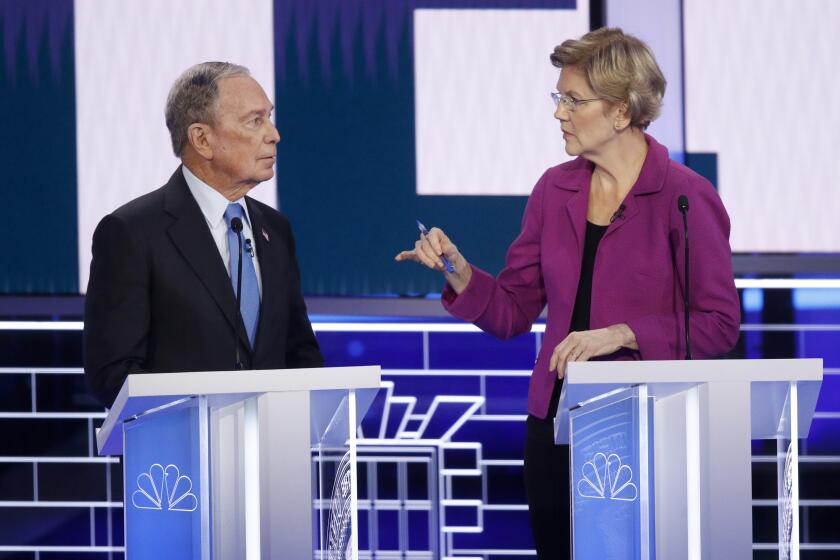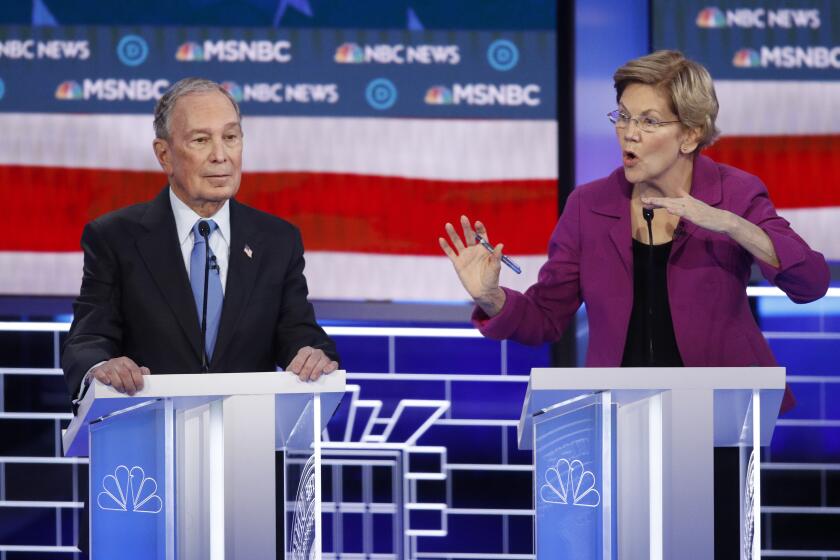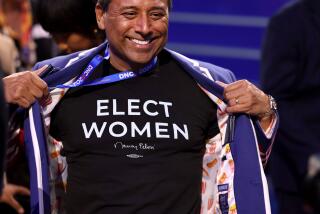Bernie Sanders again facing political fallout over supporters’ abusive behavior online
Years of accusations that Bernie Sanders has done too little to stop abusive behavior online by his supporters are resurfacing as a serious political problem for the Vermont senator, who faced attacks Wednesday from rivals suggesting he deserves some of the blame.
“I think you have to accept some responsibility and ask yourself what it is about your campaign in particular that seems to be motivating this behavior more than others,” rival Pete Buttigieg told Sanders at the Democratic presidential debate in Las Vegas.
Critics say Sanders has allowed a toxic and sometimes misogynistic culture to thrive among his most fervent backers despite his repeated statements that he does not approve of bullying or harassment.
Women in the leadership of a Nevada union that opposes his healthcare agenda were swarmed last week with vulgar and threatening emails, phone calls and Twitter posts. In the days following, Buttigieg, Joe Biden, Elizabeth Warren and Michael R. Bloomberg all questioned Sanders’ commitment to curbing the provocations.
Former New York City Mayor Michael Bloomberg made his debut on a presidential debate stage -- and spent the night fending off bitter attacks from other Democrats as the race enters a critical phase.
Warren, the senator from Massachusetts, told NBC News on Tuesday that she was especially concerned about the online assault against Geoconda Arguello-Kline, secretary-treasurer of Nevada’s powerful Culinary Workers Union, and union spokeswoman Bethany Khan. Among other things, purported Sanders supporters called them “whore,” “bitch,” “corrupt” and “fascist” after the union released a flier criticizing the senator’s “Medicare for All” plan as a threat to the union’s healthcare benefits.
“That is not how we build an inclusive Democratic party,” Warren said. “We do not build on a foundation of hate.”
At the debate, Sanders said 99.9% of his millions of Twitter followers “are decent human beings, are working people, are people who believe in justice, compassion and love, and if there are a few people who make ugly remarks, who attack trade union leaders, I disown those people. They are not part of our movement.”
Bull’s eye on Bloomberg and Sanders, a fiery Warren, and Klobuchar and Buttigieg get personal
The senator added that African American women working on his campaign had been the subject of “vicious, racist, sexist attacks.”
Buttigieg, the former mayor of South Bend, Ind., said he believed Sanders did not direct supporters’ attacks on his critics. “But at a certain point, you’ve got to ask yourself, why did this pattern arise? Why is it especially the case among your supporters that this happens?”
Sanders said he would not be shocked if Russians were behind some of the attacks attributed to his supporters.
The vitriol that some of Sanders’ most adamant supporters direct at his critics started creating political trouble for the senator in 2016, when he was running against Hillary Clinton for the Democratic presidential nomination. Online trolls, branded as “Bernie bros,” targeted journalists, politicians and Clinton supporters with vulgar and misogynistic attacks outside the bounds of traditional campaign combat.
The aggression extended at times to top Sanders surrogates. When California activist Paul Song of the progressive Courage Campaign railed against “corporate Democratic whores” at a Sanders rally in Manhattan, Clinton’s team demanded and received an apology.
Alexandra Rucinski, 30, an Iowa waitress who volunteered on the 2016 Sanders campaign for nine months, posted a Twitter thread early last year saying that “most of the Bernie people” had sexist attitudes toward Clinton, calling her shrill and unlikable, with ugly pantsuits and an evil laugh. She accused Sanders of failing to combat the sexism and said “the hard truth is that misogyny benefited him. That’s why he never curbed it. He let it grow.”
Rucinski said she was stunned by the viciousness of the backlash online.
“I got an unbelievable amount of hate and comments said about me, that I was a liar,” she said. “The sad thing I found out when my experience went viral was that my experience wasn’t unique at all. So many other women — women especially — were experiencing the same thing from Sanders supporters.”
As Sanders was launching his 2020 presidential run just over a year ago, multiple women went public with accusations of sexism, sexual harassment and pay discrimination by male supervisors in his 2016 campaign.
His initial apology struck some as dismissive. Explaining why he didn’t know about the complaints, he told CNN, “I was a little bit busy running around the country trying to make the case.”
In a second apology, Sanders was more forceful about the discrimination against women. “What they experienced was absolutely unacceptable and certainly not what a progressive campaign or any campaign should be about,” he said.
As the 2020 campaign was getting underway weeks later, Sanders urged supporters to strike a civil tone and “engage respectfully” with his opponents. “I want to be clear that I condemn bullying and harassment of any kind and in any space,” he wrote.
Cenk Uygur of ‘The Young Turks’ online talk show had won Sanders’ endorsement despite offending women, Jews, Muslims and others.
Yet when Warren said last month that Sanders told her privately in late 2018 that he did not believe Americans would elect a woman as president, his supporters starting using snake emojis to denigrate her on Twitter, and #WarrenIsASnake became a popular hashtag.
“Why Elizabeth chose to stick a knife in Bernie’s back is beyond me,” filmmaker Michael Moore, one of Sanders’ best-known supporters, wrote on Twitter.
Sanders denied making the comment privately to Warren, and she, in turn, accused him of calling her a liar.
Neera Tanden, a senior Clinton advisor in 2016 who continues to face harsh personal attacks on social media, called out the attacks on Warren. “Snake emojis are just the 2020 version of 2016’s Bern the Witch,” she wrote on Twitter.
Tanden, who is neutral in the 2020 race, said she recognized that most Sanders supporters were not sexist or abusive, but believed the online attacks have made many women, especially women of color, less comfortable about voicing opinions on social media for fear of drawing nasty responses.
Tanden said she was also concerned that Sanders supporters’ routine denunciations of his critics as corrupt, bought-off or evil would make it hard for the party to unite around its 2020 nominee. “I just don’t want to see that level of divisiveness,” she said.
Former Vice President Biden questioned whether Sanders’ response to the latest attacks by the senator’s supporters was adequate. “He may not be responsible for it, but he has some accountability,” Biden said Sunday on NBC’s “Meet the Press.”
On Monday, Bloomberg, the former mayor of New York City, tweeted an online video featuring some of the Sanders supporters’ most vile online postings. “We need to unite to defeat Trump in November,” he wrote on Twitter. “This type of ‘energy’ is not going to get us there.”
Times staff writer Mark Z. Barabak contributed to this report.
California’s primary election is March 3, 2020. Here’s what you need to know about the presidential candidates and voting on Super Tuesday.
More to Read
Get the L.A. Times Politics newsletter
Deeply reported insights into legislation, politics and policy from Sacramento, Washington and beyond. In your inbox three times per week.
You may occasionally receive promotional content from the Los Angeles Times.















